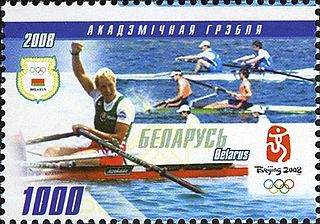| Personal information | |||||||||||||||||||||
|---|---|---|---|---|---|---|---|---|---|---|---|---|---|---|---|---|---|---|---|---|---|
| Born | 15 January 1973 | ||||||||||||||||||||
| Sport | |||||||||||||||||||||
| Sport | Rowing | ||||||||||||||||||||
Medal record
| |||||||||||||||||||||
Olaf Kaska (born 15 January 1973) is a German coxswain. He won a gold medal at the 1998 World Rowing Championships in Cologne with the lightweight men's eight. [1]
| Personal information | |||||||||||||||||||||
|---|---|---|---|---|---|---|---|---|---|---|---|---|---|---|---|---|---|---|---|---|---|
| Born | 15 January 1973 | ||||||||||||||||||||
| Sport | |||||||||||||||||||||
| Sport | Rowing | ||||||||||||||||||||
Medal record
| |||||||||||||||||||||
Olaf Kaska (born 15 January 1973) is a German coxswain. He won a gold medal at the 1998 World Rowing Championships in Cologne with the lightweight men's eight. [1]

Rowing at the 2004 Summer Olympics took place at the Schinias Olympic Rowing and Canoeing Centre and featured 550 competitors taking part in 14 events.

Olaf Karl Tufte is a Norwegian rower, firefighter, and farmer. He is a seven-time Olympian, and as a single sculler he was twice the Olympic champion and twice the world champion. He has been consistently selected to the Norwegian men's senior national rowing squad since 1996, including his selection as a 2020 Tokyo Olympian – where he made his seventh Olympic appearance, racing in the men's quadruple sculls.

The men's single sculls competition at the 2004 Summer Olympics took place at Schinias Olympic Rowing and Canoeing Centre, Greece. The event was held from 14 to 21 August and was one of six events for male competitors in Rowing at the 2004 Summer Olympics in Athens. There were 29 competitors from 29 nations, with each nation limited to a single boat in the event. The event was won by Olaf Tufte of Norway. Silver went to Jüri Jaanson of Estonia, with bronze to Ivo Yanakiev of Bulgaria. It was the first medal in the men's single sculls for all three nations. Marcel Hacker's failure to make the final made this the first men's single sculls race since 1956 without a German rower on the podium; between the United Team of Germany, East Germany, West Germany, and Germany, the German medal streak in the event had been 11 Games long.

Ólavsøka is the biggest summer festival in the Faroe Islands, and by most Faroese considered as the national holiday of the Faroes along with Flag Day on 25 April. Ólavsøka is celebrated over two days, from the 28th to the 29th of July, the second of which is the day when the Faroese Parliament (Løgting) opens its session.
The Kaska language is an endangered Athabaskan language. Traditionally, Kaska was an oral aboriginal language used by the Kaska Dena people. The Kaska Dene region consists of a small area in the Southwestern part of the Northwest Territories, the Southeastern part of Yukon Territory, and the Northern part of British Columbia. The communities that are in the Kaska Dene region are Fort Ware in N.W.T.; Ross River and Watson Lake in Y.T.; Dease Lake, Good Hope Lake, Lower Post, Fireside, and Muncho Lake in B.C. Kaska is made up of eight dialects, all of which have similar pronunciations and expressional terms. The town of Watson Lake was established around the period of the second World War when the Alaska Highway was built in 1942. A major consequence of colonization was Kaska language loss. Another major cause of Kaska language loss in Canada was due to the Canadian Residential School System. The effect that these schools had on the Kaska language have caused a language gap between two generations, resulting in few young speakers.
The Kaska or Kaska Dena are a First Nations people of the Athabaskan-speaking ethnolinguistic group living mainly in northern British Columbia and the southeastern Yukon in Canada. The Kaska language, originally spoken by the Kaska, is an Athabaskan language.
The Kaska were a loosely affiliated Bronze Age non-Indo-European tribal people, who spoke the unclassified Kaskian language and lived in mountainous East Pontic Anatolia, known from Hittite sources. They lived in the mountainous region between the core Hittite region in eastern Anatolia and the Black Sea, and are cited as the reason that the later Hittite Empire never extended northward to that area. They are sometimes identified with the Caucones known from Greek records.

Alan W Campbell is a British sculler.

Bernd Landvoigt is a retired German rower.

Jörg Landvoigt is a retired German rower.
Fredrik Bekken is a Norwegian representative rower and Olympic medalist.
Kaska may refer to:

The men's single sculls competition at the 2008 Summer Olympics in Beijing was held between 9 and 16 August, at the Shunyi Olympic Rowing-Canoeing Park. There were 32 competitors from 32 nations. The event was won by Olaf Tufte of Norway, the fifth man to successfully defend an Olympic title in the event. The silver medal went to Ondřej Synek of the Czech Republic, the nation's first medal in the event. Mahé Drysdale of New Zealand earned bronze. Both Synek and Drysdale would go on to win medals in the event again in 2012 and 2016.
Peter Wiersum is a Dutch former rowing coxswain. He is a three-time Olympian and won a world championship title in 2007.

Harald Jährling was a German rower who competed for East Germany in the 1976 Summer Olympics and in the 1980 Summer Olympics.

Olaf Förster is a retired German rower who had his best achievements in the coxless fours. In this event, he won a gold medal at the 1988 Summer Olympics and world titles in 1987 and 1989.
Kerstin Förster is a German rower.
Gert Uebeler is a German rower who competed for East Germany.
Jürgen Pfeiffer is a German rower who competed for East Germany.
Olaf Roggensack is a German rower. He competed in the men's eight event at the 2020 Summer Olympics where he won an Olympic silver medal. He has been twice a junior world champion.